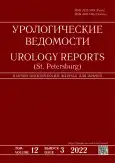Complex treatment of patients with chronic bacterial prostatitis using biologically active peptides
- Authors: Neymark A.I.1, Davydov A.V.1, Kablova I.V.1
-
Affiliations:
- Altai State Medical University
- Issue: Vol 12, No 3 (2022)
- Pages: 221-228
- Section: Original articles
- URL: https://bakhtiniada.ru/uroved/article/view/109913
- DOI: https://doi.org/10.17816/uroved109913
- ID: 109913
Cite item
Abstract
BACKGROUND: Increasing the effectiveness of the treatment of chronic bacterial prostatitis is an actual problem of modern urology.
AIM: The aim of the study was to study the effectiveness of complex treatment of patients with chronic bacterial prostatitis using Prostatex.
MATERIALS AND METHODS: This study included 94 patients with chronic bacterial prostatitis aged 21 to 45 years. Patients of group I (n = 47) received standard antibiotic therapy (levofloxacin at a dose of 500 mg 2 times a day for 28 days), and patients of group II (n = 47) received standard antibiotic therapy combined with the prescription of Prostatex in the form of rectal suppositories 10 mg once a day.
RESULTS: The overall clinical efficacy of treatment in patients of group II was 2 times higher than in patients of group I. After treatment in patients of group II compared with group I a statistically significant decrease in chronic bacterial prostatitis symptoms according to the NIH-CPSI and IPSS questionnaires was recorded. Eradication of microflora in 91.4% of patients of group II was achieved, there was a significant decrease in prostate volume, an increase in the average volumetric flow rate of urine by 89.8%, normalization of perfusion parameters and the index of microcirculation efficiency.
CONCLUSIONS: The results of the study showed that the use of Prostatex in the complex treatment of chronic bacterial prostatitis patients has a positive effect on the main symptoms of chronic prostatitis, significantly reducing pain, urination disorders and improving sexual function. This therapy helps to reduce the volume of the prostate and the volume of residual urine, restores microcirculation in the prostate gland and can be recommended in this category of patients.
Full Text
##article.viewOnOriginalSite##About the authors
Alexandr I. Neymark
Altai State Medical University
Email: neimark.a@mail.ru
ORCID iD: 0000-0002-5741-6408
SPIN-code: 4528-7765
Scopus Author ID: 7102411541
Doc. Sci. (Med.), Professor, Head of the Department of Urology and Andrology with a Course of Additional Professional Education
Russian Federation, 40, Lelina av., 656038, Barnaul, Altai RegionAndrei V. Davydov
Altai State Medical University
Email: andre1763@mail.ru
ORCID iD: 0000-0001-8212-2623
SPIN-code: 2423-1090
Doc. Sci. (Med.), Professor of the Department of Urology and Andrology with Course of Additional Professional Education
Russian Federation, 40, Lelina av., 656038, Barnaul, Altai RegionIrina V. Kablova
Altai State Medical University
Author for correspondence.
Email: irina_kablova@mail.ru
SPIN-code: 7445-0380
Cand. Sci. (Med.), Associated Professor of the Department of Urology and Andrology with Course of Additional Professional Education
Russian Federation, 40, Lelina av., 656038, Barnaul, Altai RegionReferences
- Kogan MI, Ibishev HS, Belousov II, et al. Prostatit i zabolevaniya-imitatory. Klinicheskie razbory. Moscow: Medkongress; 2019. 300 p.
- Davidov MI. Sexual dysfunction in patients with chronic prostatitis and its treatment. Urologiia. 2020;(1):51–58. (In Russ.) doi: 10.18565/urology.2020.1.51-58
- Krieger JN, Lee SW, Jeon J, et al. Epidemiology of prostatitis. Int J Antimicrob Agents. 2008;31(Suppl 1): S85–S90. doi: 10.1016/j.ijantimicag.2007.08.028
- Ibishev KhS, Kryuchkova MN, Kogan MI. Simptomy nizhnikh mochevykh putei s sindromom khronicheskoi tazovoi boli IIIA i IIIB v svyazi s affektivnoi patologiei. Proceeding Conference Dushevnye rasstroistva: ot ponimaniya k korrektsii i podderzhke. Rostov-on-Don; 2018. P. 122–125.
- Apolikhin OI, Abdullin II, Sivkov AV. Khronicheskii prostatit. Proceeding of the Plenum of the Board of the Russian Society of Urologists. Moscow: OOO Informpoligraf. 2004. P. 5–12.
- Mazo EB, Popov SV. Khronicheskii bakterial’nyi prostatit. Vrachebnoe soslovie. 2004;(1):18–28.
- Belousov II. Diagnostika i lechenie nevospalitel’noi formy khronicheskogo abakterial’nogo prostatita [dissertation]. Rostov-on-Don; 2014. 46 p. Available from: https://new-disser.ru/_avtoreferats/01005096384
- Shangiev AV. Diagnostika i lechenie vospalitel’noi formy khronicheskogo abakterial’nogo prostatita [dissertation]. Saint Petersburg; 2011. 46 p. Available from: https://new-disser.ru/_avtoreferats/01004804473.pdf?ysclid=l84mei44di128105162
- Arora HC, Eng C, Shoskes DA. Gut microbiome and chronic prostatitis/chronic pelvic pain syndrome. Ann Transl Med. 2017;5(2):30. doi: 10.21037/atm.2016.12.32
- Moiseeva TN, Serpik VG, Kulikov AYu. Farmakoekonomicheskii analiz lecheniya khronicheskogo bakterial’nogo prostatita s primeneniem monoterapii antibiotikami i kombinatsiei antibiotikov s preparatom Vobenzim. Effektivnaya Farmakoterapiya. 2012;(40): 24–29.
- Starokozhko LE, Chebotarev VV, Krasheninnikov VL, Gaidamaka II. Otsenka effektivnosti rektal’nykh svechei na gidrofil’noi osnove pri khronicheskom bakterial’nom prostatite. Meditsinskii vestnik Severnogo Kavkaza. 2012;(1):70–72.
- Tkachuk VN, Al’-Shukri SKh, Lottsan-Medvedev AK. Otsenka effektivnosti Vitaprosta u bol’nykh khronicheskim abakterial’nym prostatitom. Urologiia. 2006;(2):71–75.
Supplementary files







